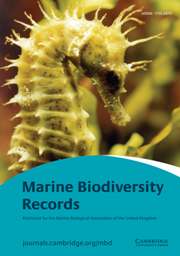Article contents
The first record of Emplectonema gracile (Nemertea: Hoplonemertea) on the Atlantic coast of North America
Published online by Cambridge University Press: 18 November 2011
Abstract
Nemerteans are common and often abundant constituents of intertidal fouling communities on jetties along Atlantic coastal inlets and groins of high-energy sandy beaches in South Carolina (SC) and elsewhere in the south-eastern United States, but they are typically hidden in crevices or among sessile invertebrates and algae. Monitoring the nemertean fauna of two rock groins at Pawleys Island, SC, USA resulted in the discovery of the barnacle predator Emplectonema gracile, a widespread species known to occur in the eastern North Atlantic, North Sea, Mediterranean Sea, Black Sea and on the Pacific coasts of Japan and Russia, but previously reported only along the Pacific coast of North America. Several individuals, some of which were reproductive, have been collected at this new locality four times since their initial discovery in 2007, suggesting that this species is established at these sites. It is likely this species was recently introduced, perhaps via ship hulls as adults or juveniles or from ship ballast water as larvae. This finding extends the range of this nemertean to the western North Atlantic and raises the number of confirmed species along the Atlantic coast of North America to 109.
Keywords
- Type
- Research Article
- Information
- Copyright
- Copyright © Marine Biological Association of the United Kingdom 2011
References
REFERENCES
- 3
- Cited by


